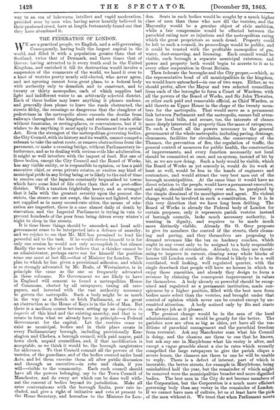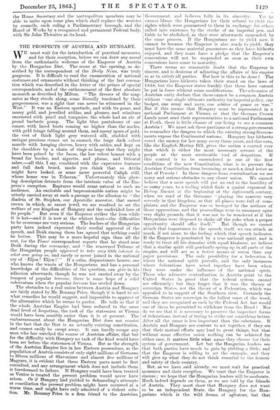THE FEDERATION OF LONDON.
WE are a practical people, we English, and a self-governing. Consequently, having built the largest capital in the world, and filled it with a population greater than that of Scotland, twice that of Denmark, and three times that of Greece, having attracted to it every tenth soul in the United Kingdom, and enriched it till its destruction would involve a suspension of the commerce of the world, we hand it over to a knot of vestries pretty nearly self-elected, who never agree, and not agreeing cannot form great plans, to a federal body with authority only to demolish and to construct, and to twenty or thirty monopolies, each of which supplies bad light and indifferent water to an arbitrarily selected district. Each of these bodies may leave anything it pleases undone, and generally does please to leave the roads obstructed, the streets filthy, the crossings so dangerous that the slaughter of pedestrians in the metropolis alone exceeds the deaths from railways throughout the kingdom, and streets and roads alike without fountains, or resting-places, or conveniences, but if it wishes to do anything it must apply to Parliament for a special Ad. Even the strongest of the metropolitan governing bodies, the City Council, with its history and its wealth, cannot compel a cabman to take the safest route, or remove obstructions from the pavement, or make a crossing bridge, without Parliamentary in- terference, and as to dealing with serious evils like adulteration, it might as well interfere with the import of food. Not one of these bodies, except the City Council and the Board of Works, has any visible entity, or is responsible to opinion, or has a paid executive chief, or owns private estates, or excites any kind of- municipal pride in any living being, or is likely to the end of time to receive one of the legacies constantly bequeathed to towns which have some kind of life other than that of a post-office district. With a taxation frightfully heavy, and so arranged that it falls with the greatest severity upon the poorest dis- stricts, the streets are not swept, the houses not lighted, water not supplied as in many second-rate cities, the means of edu- cation are imperfect, there is a case almost daily of death by starvation, and the Imperial Parliament is trying in vain to prevent hundreds of the poor from being driven every winter's night to sleep in the streets.
It is time these things should be amended, and local self- government cease to be interpreted into a defence of anarchy, and we rejoice to see that Mr. Mill has promised to lend his powerful aid to the task. If he would devote himself to it for only one session he would not only accomplish it, but silence finally the men who at heart believe that a thinker cannot be an administrator, perhaps carve out for himself the position some one must at last fill, that of Minister for London. The plan to which he has given a provisional adhesion, and which is so strongly advocated by Mr. Beale, of Westminster, is in principle the same as the one so frequently advocated in these columns. No Government we are likely to have in England will consent to found a metropolitan House of Commons, elected by all ratepayers, taxing all rate- payers, and invested with the vast authority necessary to govern the metropolis. Such a body might be as much in the way as a Scotch or Irish Parliament., or as great an obstruction as the House of Keys is in the Isle of Man. But there is a medium course between setting up an imperium in imperio of this kind and the existing anarchy, and that is to create in form what we already have in principle—a Federal Government for the capital. Let the vestries cease to exist as municipal, bodies and in their place create in every Parliamentary borough, including provisionally Ken- sington and Chelsea, a borough council, with paid mayor, paid town clerk, unpaid councillors, and, if that modification is Acceptable, as we think it would be, the borough magistrates for aldermen. To that Council commit all the powers of the vestries, of the guardians, and of the bodies created under local Acts, and let them exercise them all after public discussion and through an executive—in robe and chain, if you will—visible to the community. Each such council should have all the powers belonging, say to the Town Council of Manchester, and do every act which can be done well with- out the consent of bodies beyond its jurisdiction. Make all rates conterminous with the borough limits, poor rate in- cluded, and give a right of initiative and veto at present to the Home Secretary, and hereafter to the Minister for Lon-
don. Seats in such bodies would be sought by a much higher class of men than those who now fill the vestries, and the Mayoralty would be a genuine object of civic ambition, while a fair compromise would be effected between the parochial rating now so injurious and the metropolitan rating which the great proprietors so much dread. Property could be left to such a council, its proceedings would be public, and it could be trusted with the profitable monopolies of gas, water, dust-removing, and licensing. Each council would be visible, each borough a separate municipal existence, and power and property both would begin to accrete to it as to every other corporation in Great Britain.
Then federate the boroughs and the City proper,—which, as the representative head of all municipalities in the kingdom, we would leave untouched—in one of two ways. Either, as we should prefer, allow the Mayor and two selected councillors from each of the boroughs to form a Court of Wardens, with all the powers of the Board of Works, and Sir John Thwaites, or other such paid and removable official, as Chief Warden, or add thereto an Upper House in the shape of the twenty mem- bers for the metropolis. That would serve as a permanent link between Parliament and the metropolis, ensure full atten- tion for local bills, and secure, too, the interests of classes more deeply interested in property than the mass of ratepayers. To such a Court all the powers necessary to the general government of the whole metropolis, including paving, drainage, clearances, facilities for circulation, the conservancy of the Thames, the prevention of fire, the regulation of traffic, the general control of measures for public health, the construction of improvements, and every function necessarily not local should be committed at once, and on system, instead of bit by bit, as we are now doing. Such a body would be visible, which the Board of Works as yet scarcely is, would do its work at least as well, would be less in the hands of engineers and contractors, and would attract the very best men out of the borough municipalities. At the same time it would have no direct relation to the people, would have a permanent executive, and might, should the necessity ever arise, be paralyzed by the simple dismissal of its mouthpiece and agent. No violent change would be involved in such a constitution, for it is in this very direction that we have long been drifting. The Board of Works is already the Federal body of London for certain purposes, only it represents parish vestries instead of borough councils, lacks much necessary authority, is wanting in dignity, and requires to be made much more distinctly visible. Already Sir G. Grey proposes to give its members the control of the streets, their cleans- ing and paving, and they themselves are proposing to demand revenues like the tax on hackney coaches, which ought in any event only to be assigned to a body responsible for the freedom of circulation. Already, too, they are threat- ening to improve in earnest, clearing away whole blocks of houses till London south of the Strand is likely to be a well ventilated, well looking, well regulated quarter, with the single drawback that people will have no houses in which to enjoy those amenities, and already they design to form a revenue by claiming the consequent improvement in values. for themselves. A body already so powerful should be recog- nized and regulated as a permanent institution, made con- spicuous by a higher position, filled with the best men from bodies more select than the vestries, and brought under that control of opinion which never can be created except by un- remitted attention. A body noticed only by fits and starts can always job as it pleases.
The greatest change would be in the area of the local administrations, and it would be greatly for the better. The parishes now are often as big as cities, yet have all the tra- ditions of parochial management and the parochial freedom from restraint. Ask any Manchester man what his Council is doing, and the chances are three to one that he knows, but ask any one in Marylebone what his vestry is after, and except a vague grumble about a rise in rates which recently compelled the large ratepayers to give the parish clique a severe lesson, the chances are three to one he will be unable to reply. There is a defect of interest, part of which is incurable, the better streets, for example in Marylebone, being uninhabited half the year, but the remainder of which might be removed were the municipalities broader and more dignified bodies. The best men in the City do not become members of the Corporation, but the Corporation is a much more efficient governing body than any vestry in the remainder of London. If we cannot have men of culture, let us at least have the pick of the men without it. We trust that when Parliament meets
the Home Secretary and the metropolitan members may be able to unite upon some plan which shall replace the vestries by councils, each ruling a Parliamentary borough, and the Board of Works by a recognized and permanent Federal body, with Sir John Thwaites at its head.



































 Previous page
Previous page